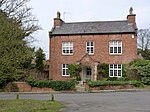Old Dalby Test Track
The Old Dalby Test Track is a railway in the United Kingdom which is used for testing new designs of trains and railway infrastructure. It runs between Melton Mowbray, Leicestershire and Edwalton, on the course of the Midland Railway's route between Kettering and Nottingham which closed to passengers on 1 May 1967, and to goods in 1968. It is 13.5 miles (21.7 km) in length. Since its first use at a test track in May 1966, the Old Dalby Test Track has been involved in numerous projects, one early major initiative being British Rail Research Division's Advanced Passenger Train project. In addition to its use by trains, various elements of line-side infrastructure, such as overhead line (OHLE) and signaling equipment, have also been tested on the line. During July 1984, a destructive full-scale integrity test of a nuclear flask train was conducted, witnessed by a large crowd; most testing has been closed to the public and security measures are typically present around the line to deter intrusion. During the mid-1990s, as a result of British Rail's privatisation, ownership of the line was transferred to BRB (Residuary) Limited, while its historic main user, the Research Division, was abolished. In the privatisation era, Old Dalby has been leased out to various companies, including Serco, Alstom, and Metronet to conduct testing. Alstom electrified the former Down line using 25 kV AC OHLE at a reported cost of £25 million, and reinstated a six-mile portion of the Up line, to support its activities. During the 2010s, there was public speculation that the test track could form part of a direct link between Nottingham and Melton Mowbray for the purpose of re-introducing a passenger service.
Excerpt from the Wikipedia article Old Dalby Test Track (License: CC BY-SA 3.0, Authors).Old Dalby Test Track
Station Road, Melton Broughton and Old Dalby
Geographical coordinates (GPS) Address Nearby Places Show on map
Geographical coordinates (GPS)
| Latitude | Longitude |
|---|---|
| N 52.808888888889 ° | E -0.99333333333333 ° |
Address
Old Dalby
Station Road
LE14 3NE Melton, Broughton and Old Dalby
England, United Kingdom
Open on Google Maps









